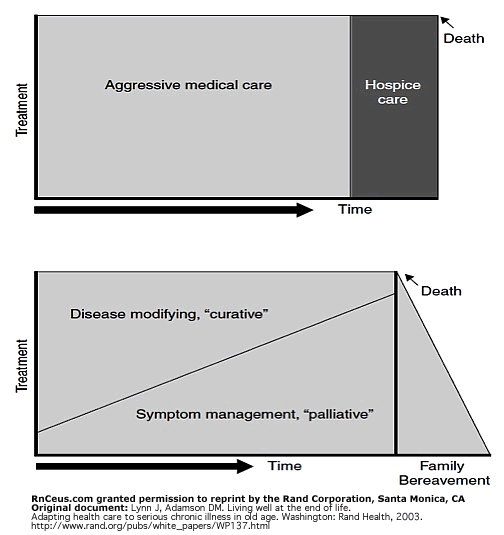Palliative care
Palliative care defined:
Care that provides relief from pain and other symptoms, supports quality of life, and is focused on patients with serious advanced illness and their families. Palliative care may begin early in the course of treatment for a serious illness and may be delivered in a number of ways across the continuum of healthcare settings, including in the home, nursing homes, long-term acute care facilities, acute care hospitals, and outpatient clinics. Palliative care encompasses hospice and specialty palliative care, as well as basic palliative care (National Quality Forum, 2006, p. 27).
 Palliative care has evolved from a "Transition" model that focused on curative treatment until those options were exhausted, at which time Palliative care was initiated. Recently, Lynn and Adamson (2003) introduced a "Trajectory" care model. Their model better reflects the course of chronic disease in the elderly by integrating curative and palliative care. "Early in the course of their illness, many need both curative treatment as well as “ palliative ” care aimed at treating symptoms; and late in life, some treatments may still stall the progression of illness, even while most needs are for relieving symptoms and providing support." The "Trajectory" model also encompasses bereavement support for the family.
Palliative care has evolved from a "Transition" model that focused on curative treatment until those options were exhausted, at which time Palliative care was initiated. Recently, Lynn and Adamson (2003) introduced a "Trajectory" care model. Their model better reflects the course of chronic disease in the elderly by integrating curative and palliative care. "Early in the course of their illness, many need both curative treatment as well as “ palliative ” care aimed at treating symptoms; and late in life, some treatments may still stall the progression of illness, even while most needs are for relieving symptoms and providing support." The "Trajectory" model also encompasses bereavement support for the family.
References:
Lynn, J., & Adamson, D. M. (2003). Living well at the end of life: Adapting health care to serious chronic illness in old age (Accession No. ADA416211). Santa Monica, CA: RAND Health.
National Quality Forum. (2006). National voluntary consensus standards for palliative care and end-of-life care. Retrieved from http://www.qualityforum.org/Projects/ Palliative_Care_and_End-of-Life_Care.aspx
©RnCeus.com
 Palliative care has evolved from a "Transition" model that focused on curative treatment until those options were exhausted, at which time Palliative care was initiated. Recently, Lynn and Adamson (2003) introduced a "Trajectory" care model. Their model better reflects the course of chronic disease in the elderly by integrating curative and palliative care. "Early in the course of their illness, many need both curative treatment as well as “ palliative ” care aimed at treating symptoms; and late in life, some treatments may still stall the progression of illness, even while most needs are for relieving symptoms and providing support." The "Trajectory" model also encompasses bereavement support for the family.
Palliative care has evolved from a "Transition" model that focused on curative treatment until those options were exhausted, at which time Palliative care was initiated. Recently, Lynn and Adamson (2003) introduced a "Trajectory" care model. Their model better reflects the course of chronic disease in the elderly by integrating curative and palliative care. "Early in the course of their illness, many need both curative treatment as well as “ palliative ” care aimed at treating symptoms; and late in life, some treatments may still stall the progression of illness, even while most needs are for relieving symptoms and providing support." The "Trajectory" model also encompasses bereavement support for the family.